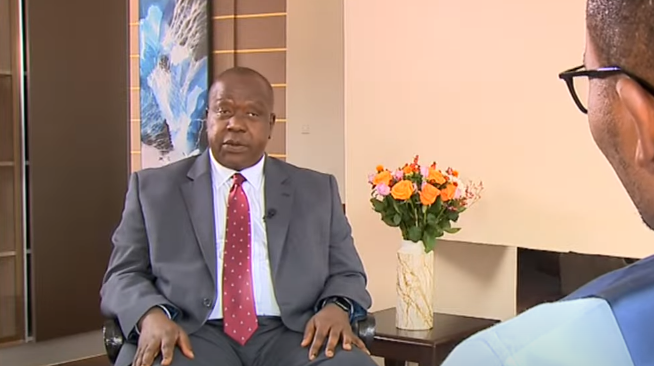Former Interior and Education Cabinet Secretary Dr. Fred Matiang’i has officially announced his bid for the Kenyan presidency in 2027, confirming his intentions in a recent Citizen TV interview. With nearly a decade of experience serving under President Uhuru Kenyatta, Matiang’i aims to foster a united and prosperous Kenya, while also confronting past controversies and contemporary national challenges.
Matiang’i is actively engaging with various opposition leaders and political parties to build a broad coalition for his presidential campaign. He emphasizes the need for a “hardworking, honest consensus builder” to lead Kenya, expressing concern over the current “level of pain and misery” in the country despite its abundant resources and potential. Drawing on his extensive government experience, Matiang’i believes Kenya is underperforming and asserts the nation’s capacity for greater achievement. His campaign will prioritize addressing systemic issues, rebuilding trust, and mobilizing citizens to unlock Kenya’s full potential.
During the interview, Matiang’i addressed several past controversies. Regarding allegations of extrajudicial killings and the discovery of 36 bodies in River Yala during his tenure as Interior Cabinet Secretary, he clarified that investigations were ongoing when he left office in 2022. He advocated for a public inquest to ensure transparency and accountability, asserting the police’s operational independence and his inability as a minister to influence ongoing investigations. Concerning the Ruaraka land deal, where he faced accusations of irregular land acquisition as Education Cabinet Secretary, Matiang’i maintained his minimal involvement. He explained that land acquisitions fall under the National Land Commission’s purview, not the Education Ministry, and a court ruling six years prior cleared him of wrongdoing. He also dismissed a 2017 statement, where he allegedly encouraged youth to “rough up” those blocking voting in Kisii, as a misquote taken out of context that he clarified in parliament at the time.
Commenting on recent protests, particularly the unprecedented storming of parliament by Gen Z in 2024, Matiang’i expressed dismay at the government’s failure to anticipate and address public discontent. He asserted that such events would not have occurred “under my watch,” citing the capabilities of Kenya’s National Intelligence Service. He called for a national dialogue to engage young people, acknowledging their frustration and feeling unheard, and criticized the lack of follow-through on promises to address youth concerns. Matiang’i defended his record on handling protests during his time in office, distinguishing between peaceful Gen Z demonstrations and the volatile 2017 protests, which he viewed as security risks due to potential exploitation by terrorist groups. He denied ever ordering excessive force, emphasizing that police actions were guided by the National Security Council and officers violating protocols faced legal consequences.
Strategically, Matiang’i is in discussions with multiple political parties, including the United Democratic Alliance (UDA) and Jubilee, who have expressed interest in him as a potential candidate. He considers the interest from seven or eight parties “flattering” but stresses the importance of forming a broad coalition, believing that “we are better off as a country when we work together.” He dismissed suggestions of being an “Uhuru Kenyatta project,” highlighting his extensive career beyond his service under Kenyatta, including his recent stint at the World Bank. Matiang’i also addressed comments from opposition leader Gachagua, who suggested he strengthen his base in Kisii, expressing willingness to engage directly to understand Gachagua’s perspective, advocating for patience and tolerance in coalition building.
As the architect of the Competency-Based Curriculum (CBC), Matiang’i acknowledged challenges in its implementation, particularly regarding the transition to senior secondary school in 2026. While he has not conducted a detailed review since leaving the Education Ministry, he suggested the need for better stakeholder engagement to address issues like classroom shortages and examination fees, noting that “challenges are expected” in the initial cycle of a new curriculum.
Reflecting on personal matters, Matiang’i briefly addressed the 2023 attack on his residence, describing it as a “painful and traumatizing” incident he prefers not to dwell on, expressing gratitude to his successor, Prof. Kithure Kindiki, for handling the matter responsibly. Regarding campaign financing, Matiang’i plans to seek transparent support from well-wishers and donors, acknowledging the high cost of campaigns in Kenya while rejecting any illicit funding. Having recently left his position at the World Bank, Matiang’i is now fully dedicated to his political ambitions. He declined to disclose his net worth, stating it is not for public consumption unless legally required, but affirmed his willingness to face scrutiny as a candidate.
Dr. Fred Matiang’i’s announcement marks a significant development in Kenya’s political landscape as the 2027 elections approach. His emphasis on unity, accountability, and dialogue resonates with a populace grappling with economic and social challenges. However, his past, marked by both achievements and controversies, will undoubtedly shape the narrative of his campaign. His ability to address lingering questions and inspire trust among Kenyans will be critical to his presidential bid.
